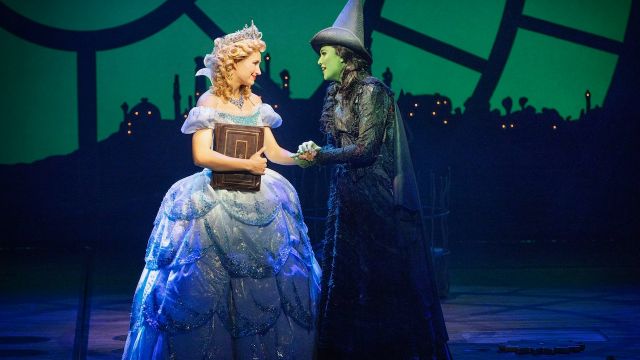Growing Into Elphaba and Glinda
New generations are seeing the Wonderful World of Oz from a fresh perspective thanks to Wicked. Australia’s new Glinda and Elphaba speak to Neil Litchfield about the show and growing up with two different versions of their characters.
For several generations we’ve all grown up with the iconic 1939 MGM movie of The Wizard of Oz, forming indelible memories of Billie Burke’s Glinda, the Good Witch of the North, and Margaret Hamilton’s stereotypical Wicked Witch of the West, not to mention her alter ego, Miss Gulch.
But are new generations forming their first impression of these characters based on Wicked, rather than the classic movie.
Gregory Maguire’s revisionist vision of L. Frank Baum's The Wonderful Wizard of Oz – through his novel Wicked: The Life and Times of the Wicked Witch of the West, and the hit musical it has inspired - have re-shaped our perception of these characters, taking us back in time to a prequel world (dare I say, an ‘alternate universe’), of their college friendship, where both characters reveal greater depth and humanity.
The Wicked Witch of the West is no longer known by a stereotype villain label; she’s Elphaba, and we love her. It’s only Madame Morrible (rhymes with horrible) who dubs her the wicked witch, during the transformational ‘Defying Gravity’ scene.
Although our latest Glinda (Courtney Monsma) and Elphaba (Sheridan Adams) have both grown up with The Wizard of Oz, Wicked has also been rooted in both their consciousnesses since childhood.
“I first heard Wicked on YouTube, obviously sung by Idina Menzel,” Sheridan explained. “I distinctly remember being quite young in my living room and Chromecasting ‘The Wizard and I’ karaoke onto my TV. I would sing it over and over, trying to hit it out of the park like Idina does. It’s quite surreal that I'll be able to sing it on stage in front of a lot of people now.
“My mum and my dad would be listening, and they still love it when I get to perform. My older brother remembers me putting on little dances in the living room in my fairy dress. They've always been my number one audience members.
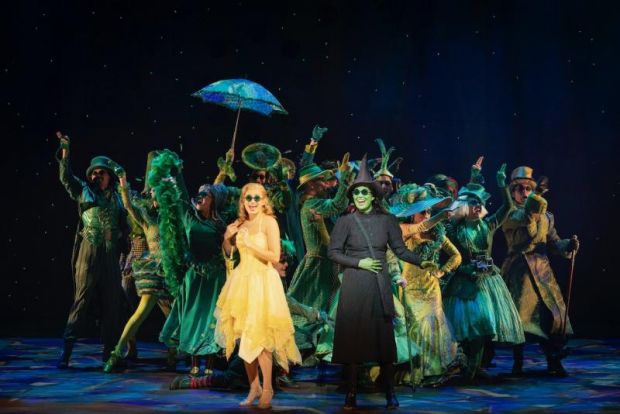
Similarly, young Courtney sang along to the cast recording, teaming up with her sister for the duets.
“We were always playing both characters and now my sister is actually in this professional production as well, so that's crazy,” Courtney shared. “We would always sing ‘What Is This Feeling’ and all the duets together. I always sang ‘Popular’ at eisteddfods, and even did a song and dance to it when I was a kid. Maybe not ‘Defying Gravity’. I was obviously more of a Glinda even back then.
“I went to the show on a school excursion; the only times I could afford to go to the theatre were through school. Having had the opportunities to go on a bus to the big theatre and sit at the top of the dress circle is a really nice thing to remember while I’m doing these big shows; it's the spark that happens when you watch that makes you get to where you are now.
“I grew up on the Gold Coast, where I did many community theatre productions, which I loved.”
Sheridan was also active in school and community theatre productions.
“My first musical was The Wizard of Oz; thank you very much universe,” Sheridan told me. “That opened my eyes up to musical theatre and led me straight into Wicked, so I started singing and immersing myself in the Wicked repertoire when I was 12 or 13.
“I'm lucky that my high school department and my teacher really believed in me and cast me in leading roles in all my school shows. As I did each musical, year by year, my love for them just grew stronger. From the age of 13, I was doing at least two shows a year. I would do the high school show and my dad would drive me around to rehearsals.”
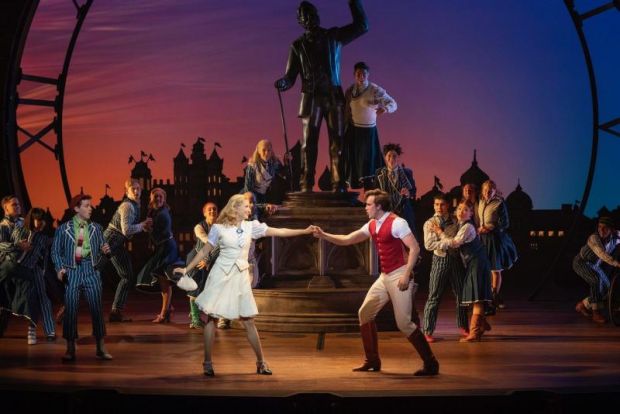
Both performers share their excitement at where their musical theatre journeys have led them.
“Elphaba has always been my dream role since I was little,” Sheridan admits, “and I remember thinking, ‘Oh my gosh, I got an audition.’ Just getting in the room was a big deal for me.
“During Covid a lot of actors wanted to give up; they had that hard conversation with themselves about is this what I want to do? I'm glad that throughout Covid I found my love for music theatre, so that when Wicked did come around, I was invested and ready as ever. I also had some auditions under my belt that helped me prepare. There were a lot of magical forces at play that allowed me to be where I needed to be.”
“It feels very meant to be,” Courtney tells me. “I've been very fortunate to have a wonderful professional career so far, and it feels like it was all leading to this moment. It's a very iconic show, and on a personal level, with the element of my sister being in the show, feels like some sort of fate.”
When we get a hint that Dorothy has arrived in Oz during Wicked, at that moment Elphaba is a character who we love, yet in the parallel universe of The Wizard of Oz, already she’s looming as Dorothy’s dark nemesis.
“People say how can it be the same person,” Sheridan explains, “and I remember reading that in the original novel, it's different to the musical. You've got to be able to separate each version of the Wicked Witch of the West.
“Gregory Maguire put it that the weight of the world had fallen on her. She was very sleep deprived in the book, which has caused her to act irrationally. She's a product of her environment and society and finally unfortunately towards the end she gives in in the movie of The Wizard of Oz. But with Elphaba in Wicked, although they're connected, the objective slightly shifts to make her more relatable.’
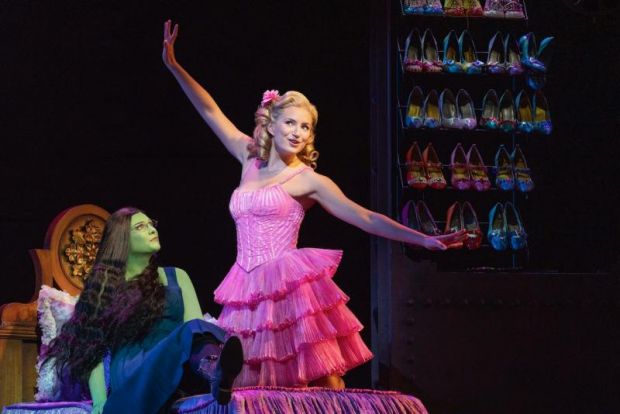
Glinda, of course, initially seems to have much more in common with her movie counterpart, even though it’s a far more textured interpretation.
“Seeing The Wizard of Oz as a child is seeing Glinda on such a surface level compared to what I get to learn from her,” Courtney reflects, “but it's so fascinating, particularly psychologically. You see the choices that she makes and the facade that she often has to have and when she makes those choices. It's all around the realm of what's good and bad. It becomes that having to lie about something is what is best for everyone else, and that's the ‘new good’. She's so much more layered in Wicked and you learn her heart, which is my favourite part. On a surface level you can judge Glinda for being ‘Oh yeah, blah, blah, blah’, but then you get to realise the human version of her and that's really cool.”
So, is a whole new generation of young theatregoers forming their impressions of these characters based on Wicked, rather than the classic film?
“It’s definitely a timeless film, which a lot of children today watch,” Sheridan said, “but with the Wicked movie coming out, with Ariana Grande and Cynthia Irevo, that might play into what you're talking about. I've never thought that maybe for little ones growing up, Elphaba from Wicked might be the first iteration of the Wicked Witch of the West that they’ve seen. That offers a lot of questions about what is wicked, and what is good, and who she really is. She's not a stereotype, so there's a lot more to unpack. If I’m people’s first introduction to Elphaba and the Wicked Witch, that would be really crazy.”
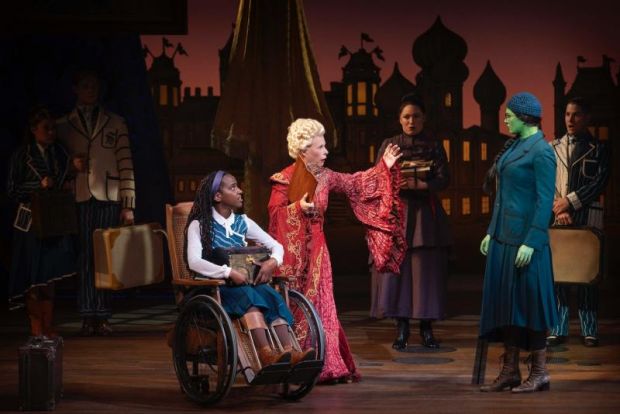
But these young performers are by no means over-awed in the way we all were as children. They relish the deeper exploration of their characters and constantly push to understand them.
I put it to Courtney and Sheridan, that Glinda and Elphaba’s friendship is bookended by wonderful, contrasting duets, ‘Loathing’ and ‘For Good’.
What is this feeling?
Fervid as a flame
Does it have a name?
Yes
Loathing
Unadulterated loathing
For your face
Your voice
Your clothing
Let's just say - I loathe it all.
“Steven Schwartz is a very intelligent writer and composer and lyricist. ‘Loathing’ captures this intense feeling when they first lay their eyes upon one another and it’s that feeling of loathing, rather than hatred,” Sheridan said.
“It’s special going through that journey, especially musically,” says Courtney. “From being who people want you to be, and then being who you are. I love that you get to go through that journey with the songs.
“With ‘Loathing’, it’s what is this feeling? Sometimes it can feel like hate can be love too. It's just the uncomfortableness of ‘Why does this person get on my nerves?’ They both interest each other as much as they can't stand each other. The audience can see that before they know it, but with Glinda, she's only really nasty when other people are around because she thinks that's what they want to hear. It's about her thinking more publicly, and then throughout their other songs, they are more private and that's the journey that they get to share with each other.”
“Musically, ‘Loathing’ is very staccato,” Sheridan explains. “It's very on the beat, it's very passionate, it's fiery, you've got those consonants. ‘For Good’ is the complete opposite. It's very different stylistically and musically. It’s this beautiful, slightly more relaxed rhythmically composed song where both characters get to breathe, but there is still a huge amount of emotion. You've got a song of loathing, but then you end with a song of love. It showcases how they grow, and how they shift, and how they come to change each other for good.”
Like a comet pulled from orbit
As it passes a sun
Like a stream that meets a boulder
Halfway through the wood
Who can say if I've been changed for the better?
But because I knew you
I have been changed for good.
“It's been chaotic the whole time. ‘For Good’ is the first real moment that it slows down, just pauses for a moment in time, and it's like everything that they didn't know how to say comes out,” Courtney adds. “It's very layered, a very emotional moment and it's just written so beautifully - the pace and the lyricism of it.’’
In between, though, both Elphaba and Glinda have wonderful defining songs, in which they share their thoughts with each other. Close on the heels of ‘Loathing’ follows ‘Popular’.
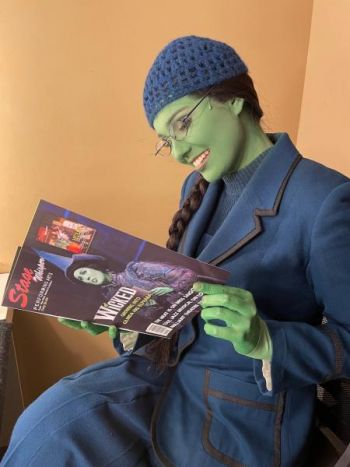 “Elphaba is very much taking ‘Popular’ in,” Sheridan reflected. “It's definitely Glinda's time to shine but it is fun for Elphaba to be a part of that. There’s a moment where she lets Glinda in and that's the birth of the friendship.”
“Elphaba is very much taking ‘Popular’ in,” Sheridan reflected. “It's definitely Glinda's time to shine but it is fun for Elphaba to be a part of that. There’s a moment where she lets Glinda in and that's the birth of the friendship.”
“It’s the first time Glinda makes a choice to stand up for Elphaba,” Courtney related. “She realises it goes well and then she's like, ‘Oh this is just the beginning, so I can save you,’ which is very, very Glinda. She's like, ‘You're my best friend.’ She's very zero to a hundred. She's gone from hate to love in an instant. In the moment she just gets carried away with herself, so that's a special moment for Elphaba to experience as well.”
And how does the music of ‘Popular’ match the moment?
“The fast-paced patter of the song, the style of the song, the length of the song,” Courtney explained. “It's such a journey. She just can't speak fast enough and that's why it’s six minutes. It’s very bouncy and it's matching exactly what she's doing - her excitement.”
“The song ‘Defying Gravity’ itself is incredible,” Sheridan enthused. “It's not just the final 30 seconds that I find so memorable and powerful - it's the whole scene and song - about 8 minutes of it (including) Robyn Nevin smashing Madame Morrible’s monologue out of the park, and how that kicks Elphaba into gear. It's just such a powerful moment in the show for Elphaba to finally hear those words ‘wicked witch’.
“I'm also really excited to fly. When I was young, that moment really impacted me. It's such a huge moment for both Glinda and Elphaba; they choose their pathways, they make their decisions and they go their separate ways but it is together. Even though they go in opposite directions, they’re still so connected in that moment.
“On top of that it's probably the best sing in the entire show.”
So, whether you’re a fan of the 1939 movie – or itching to get your hands on tickets to this new production – or both, the magic will continue. After all, friendship is timeless, and how we see others is always perception.
Australian production images by Jeff Busby.
Wicked plays at Sydney Lyric until February 4, 2024, then transf3ers to the Regent Theatre, Melbourne from March 6.
Subscribe to our E-Newsletter, buy our latest print edition or find a Performing Arts book at Book Nook.

